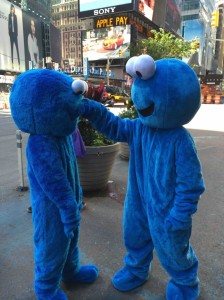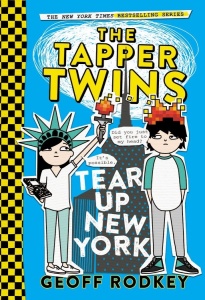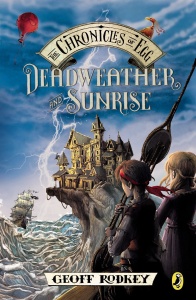Today it is my delight and honor to have the writer who has been at the top of my guest-wish list for a long time: Geoff Rodkey.
If you are not immediately familiar with the name, I know you are familiar with his work. Geoff is a multi-talented, multi-faceted writer and had shared his talents in everything from stand-up comedy, through short stories, TV, (“Good Luck Charlie”) movies, (“Daddy Day Care”, Tim Allen’s “The Shaggy Dog”), and books, which are among the favorites of mine: “The Chronicles of Egg” trilogy and “The Tapper Twins” series.
Welcome, Geoff!
What I think the followers of this blog would be interested in is the family aspect of so many of your ‘hits’.
In “The Tapper Twins”, (your current book series), the kids act like kids, but good triumphs over evil every time,(not that there is real ‘evil’). The twins bicker, the parents bicker, but there is always true family love and caring for others that comes through. What calls you to write your stories with such great feelings?
There is another successful book series written for the Tapper Twin target readers that, although I find the books amusing, are just not as ‘nice’ as yours. For those of us who truly care about what fills the minds of children, I thank you for giving such inspiration to them.
It’s interesting (and gratifying!) that the Tapper Twins books struck you as “nice,” because I’ve also encountered readers, including a couple of potential publishers, who didn’t find the twins nearly nice enough. I don’t think I had any conscious intent one way or another—as with most stories, I was just trying to create believably human characters, with both the generally good intentions and character flaws that the average person has.
The Tapper Twins are a girl and a boy, Middle School age. Do you find that their appeals is to a larger section of readers? I personally find the stories engaging and the humor to be brilliant. The fun comes from situations, without obvious ‘jokes’, and although often carry books with me, I never take a T-Twin book for fear I will be literally laughing out loud in public! (My husband has just learned to accept my guffaws and laugh-tear riddled cheeks!)
I’d definitely like to think the Tapper Twins appeal to readers of any age. I try not to write down to the audience—most of the humor is in there because I find it funny, and I’m 45. Some of the jokes definitely go over the heads of the average 10-year-old, but I think that’s okay—when I was a kid reading Mad magazine, I’d frequently come across lines that were clearly jokes, but were referencing things that only adults (or very hip kids) would get, so I had no idea why they were funny. But I didn’t mind—it was almost like a challenge to figure it out, and on the few occasions I did, I felt like I’d unlocked some kind of secret code.
A certain amount of the humor in my newest book, The Tapper Twins Run for President, is like that. There are a lot of subtextual references to real-world presidential campaigns, and while I think kids will find it funny even without getting the references, adults who are old enough to, say, know who Carville and Matalin are might appreciate it on a level that the kids don’t necessarily get.
What gave you the idea of the alternating report format to the stories, with Claudia and Reese taking turns giving their reports, interspersed with their friends’ versions of what went on and the texts from the parents, (which are all too funny!)?
Most of the impetus for the oral-history structure—as well as the text messages, the photos, the fake video game screenshots, etc.—came from my wanting to create the kind of book that my middle son, who’s a very reluctant reader, would actually want to read. I was trying to think of this series less as “books” than as “book-shaped entertainment delivery vehicles.”
The Tapper Twins “live” in New York City, which is where you are raising your family. I love the real photos of the area that you use. That is a far cry from the completely different world that you created for The Chronicles of Egg. What gave you the inspiration for Egg, his family and friends?
Honestly, I’m not sure where the ideas for the characters came from. I know the series itself started as a joke idea about a pirate named Crooked Pete, who all the other pirates thought was cursed. So they wouldn’t let him on their ships, and the only job he could get was working as a waiter in a pirate-themed restaurant.
I thought that was funny, and I started thinking about what kind of world could accommodate both multiple pirate crews and a pirate-themed restaurant. I spent about two years chewing on it, and by the time it became a book, the tone was completely different, and everything about the original idea was gone except for an island used as a base by multiple pirate crews.
How I got from point A to point Z on that, and where the various characters came from, I have no idea. Creativity is weird that way.
Was it more difficult to create a new world, or is it more of a challenge to keep up with American Middle-schoolers?
In the beginning, writing the Tapper Twins was as easy as falling off a log, because I had three kids who were all growing up in New York City and within spitting distance of age 12. But now my youngest kid is almost 12, and the older ones are 14 and 16. So if I keep writing more Tapper Twins books, it’s going to get harder and harder, because eventually, I’m going to lose my window into the speech patterns of 12-year-old New Yorkers, and I’ll have no idea how they talk.
By contrast, creating your own world is hard, and in the case of the Egg books paradoxically required a lot of research, because the universe was loosely based on the Caribbean of the 17th-18th century. But the advantage is that in an invented world, nobody can accuse you of getting the details wrong.
You know that I have to ask, since my grandson brought it up again a couple of weeks ago: Is there any chance of seeing more of Egg, either a short time after we left him or many years later? The characters truly became part of our own world. [When my grandson,(now 13), recently moved out-of-state, he asked me to hang onto some of his past-read books and The Chronicles of Egg were among those he asked me to keep forever for him. I believe he wants his future children to read them.]
I’m so glad you and your grandson enjoyed the books that much! If they ever reach a wider audience, I’d love to write more. I actually have two ideas for additional stories in that universe. One is a second trilogy that picks up where the first one left off, in which Egg and the other characters leave the colonial islands for the old-world continent and wind up getting involved in the equivalent of the French Revolution. The other is a prequel in which the adult characters in the Egg series are all teenagers—It explains the back story of characters like the pirate captain and the primary villain, which is something that’s hinted at in the original series, but never explored at length.
Unfortunately, though, until the day the publisher of the Egg books asks for more, I literally can’t afford to devote the necessary time to write those stories. This is the down side of writing as a profession—if you want to keep food on the table, you’re generally limited to telling the stories that people will pay you to write. And while the Egg books have done okay so far commercially, they haven’t done well enough for the publisher to want to invest in more of them. (Yet!)
With all of your works, is there a field/genre in which you prefer to write? [Which is the most fun? The most rewarding?]
I’ve found writing books to be much more satisfying than writing screenplays. Primarily, that’s because a book is a finished piece of work—what you write is what the audience experiences. In contrast, a screenplay is just a blueprint for a piece of work, and until a large number of (usually well-financed) people invest the time, energy, and money to turn that blueprint into a film, it doesn’t really exist in the world. And unfortunately, when a screenplay does get made into a movie by a major studio, it’s almost inevitably rewritten by other people—so what the audience experiences isn’t necessarily what the original screenwriter intended. Sometimes, it’s better; sometimes, it’s worse; but in both cases, even though your name might be on it as a writer, it’s not really yours. And that can be very weird, and occasionally painful.
But the other side of that coin is that the audience for movies and TV is incomparably larger than the audience for books. The total number of people who’ve read my books is basically a rounding error on the first weekend’s ticket sales for my least successful movie. So there’s definitely a tradeoff involved.
I know first-hand that having an unagented play is next to impossible to get read. I have heard that breaking in to screenwriting is difficult; did you find it to be?
Yes and no. I had to live in LA for a while, working on the fringes of the industry, until I developed enough professional contacts that I could get a script into the hands of an agent once I finally wrote a screenplay worth reading. Just as importantly, learning to write a script worth reading took years. Everybody’s first effort, whether it’s a book or a script, will inevitably suck, and you usually have to keep at it over multiple projects before your skills develop to the point where you can do good work.
But once I had those things—a good script and contacts who could introduce me to agents—it wasn’t nearly as difficult as it would be now. I broke into the industry in 1997, when studios still routinely bought original scripts and developed them into movies. For a lot of reasons, it doesn’t really work that way anymore (and least, not very often), and the film business has become so ridiculously difficult to succeed in as a writer that almost all of the screenwriters I know—even the highly successful ones—have moved into television, where there’s much more opportunity. (Although even that is difficult.)
Do you hope to see any of your books become movies? (Of course we thought Egg would be condensed to be at least one movie.)
I’d love to see one of the books become a movie, mostly because it’d mean a lot more people would be exposed to the book. But it’s kind of a catch 22—books sell a lot of copies when they become movies, but only books that have sold a lot of copies become movies. And to this point, while my books have been modestly successful, they haven’t come anywhere near the stratospheric sales figures that usually lead to a movie.
Since most rights to books and stories are sold into options for films with the authors having little to no influence over how they are used, would that be a problem for you, to hand over your work? Or with your considerable screen-writing credits, do you think it would be easier for you to become part of a production/writing team using your work?
Given my work history, I think it’d be pretty easy for me to make a case as the first writer of the screenplay. Whether I’d actually want to write the script is another question. Creatively, I’m not sure. But I’d probably do it just for the health care coverage. The WGA health care plan is fantastic—it’s the thing I miss most about the film business.
Geoff, is there anything else that you would like to tell our readers?
Please read my books? Or is that too crass? [Not at all! Do yourself a favor,Readers, read Geoff’s books!-T]
How can they learn more about you and your work?
You can learn more about the books via my web site –http:// http://geoffrodkey.com – or the series web sites,http:// http://tappertwins.com and http://chroniclesofegg.com . I’m also on Twitter as @GeoffRodkey.
Thank you so much for being my guest today, Geoff Rodkey.
Thanks, Tonette! My pleasure.
Geoff Rodkey is the author of the New York Times bestseller The Tapper Twins Go To War (With Each Other) and its sequels The Tapper Twins Tear Up New York, The Tapper Twins Run For President, and The Tapper Twins Go Viral (pub. date 4/17). He also wrote the acclaimed adventure-comedy trilogy The Chronicles of Egg, the first book of which (Deadweather and Sunrise) was shortlisted for the Waterstones Children’s Book Prize in the U.K. and was an Amazon, Chicago Public Library, and Bank Street Center for Children’s Literature Best Book of the Year in 2012.
Geoff’s also the Emmy-nominated screenwriter of the hit films Daddy Day Care, RV, The Shaggy Dog, and the Disney Channel’s Good Luck Charlie, It’s Christmas. He’s written for the educational video game Where In the World Is Carmen Sandiego?, the non-educational MTV series Beavis and Butt-head, Comedy Central’s Politically Incorrect, and several magazines that no longer exist. He also enjoyed a brief but satisfying career as the semi-fictional character Geoff the Research Assistant in future Senator Al Franken’s bestselling book Rush Limbaugh Is a Big Fat Idiot and Other Observations.
Geoff lives in New York City with his wife and three sons, none of whom bear any resemblance whatsoever to the characters in The Tapper Twins.





delighted to meet you, Geoff — and really enjoyed this interview. Nice to see a fellow hound here at 4F1H.
Really like your distinction about books versus screenplays.
In this interview the focus seems (logically) about how it is to see your own original work being transformed into a visual medium (movie or TV)… but I’m wondering how it felt to take someone else’s work and write the screenplay. Or, do I have it wrong and you were also the original writer of those stories which became movies?
I think I would enjoy the Tapper Twins — and the Egg chronicles, for that matter — though I’m far from being a kid.
LikeLike
Hi, Jeff — To answer your question, the majority of the films I worked on were my original ideas. The exceptions were a remake of The Shaggy Dog (for which I was one of many writers) and a Disney Channel TV movie that was an extension of one of their sitcoms, Good Luck Charlie. The Shaggy Dog job was an interesting challenge, as I worked on it starting in preproduction, and not only were there multiple prior scripts, but many different people — director, producers, actors, studio — who had input into the story and characters. As much as anything, that job was about shepherding all the differing material and perspectives into a single (and hopefully coherent) story. The Good Luck Charlie project was, in contrast, very simple — all the characters already existed and had well-defined voices, so the only heavy lifting was in creating a story structure that serviced the characters and what the network wanted to do with them. Both experiences were pretty satisfying, and actually less difficult in some ways (especially psychologically) than projects that were my original ideas. When what you’re writing isn’t fundamentally “yours” in the same way that it is with an original idea, you’re a lot less precious about it, and there’s much less stress over both the process and the finished product. At least, that was my experience.
LikeLiked by 1 person
Wow — it all sounds exciting. Though, for me — having retired from a career which required constant collaboration on committees even when I could more easily do something by myself — I think having to deal with all that extraneous input would only add to the confusion and slow down the production.
You must have a special affinity for working with others. You know, like they used to evaluate in kindergarten: “plays well with others”. LOL
Correct, we writers are much more protective of the “precious-ness” of our own babies.
LikeLike
I knew I wanted to have you in, Geoff, in as soon as I read the first of the Chronicles of Egg trilogies, but you have come though beyond my dreams. Best Guest Ever Award!
You would really like Egg,Jeff.I guarantee it. Although there are plenty of women and girls in the story, there is enough action and boys/men to satisfy boy readers, unlike so many other YA books. Read it with your grandkids.
LikeLiked by 1 person
Welcome, Geoff! Wow, a real celebrity. I don’t see many movies, but I have heard of some of yours. I’ll have to get some of your books for my grandkids – but I’ll read them before wrapping them up! How awesome that you were able to use your own children as models for your characters. Why couldn’t your characters age as your children do?
LikeLiked by 1 person
Although the Tapper Twins have appeal for all ages, Patty, Geoff would lose his target audience…and it would be a shame to lose the influence he has with the Middle School kids. If you have ever read any of the Wimpy Kid series, you know that they ARE funny, but the Tapper Twins are nicer kids,(if not perfect angels all the time.)
LikeLiked by 1 person
Tonette’s right — keeping the characters the same age is a marketing/audience thing. And it can actually work well creatively — the Simpsons have been on for almost 30 years, nobody’s aged a day, but the show’s still pretty good.
LikeLiked by 2 people
Dennis the Menace is still 7 yrs old, after 60-plus years.
Beetle Bailey is apparently still a boot camp private.
Dagwood never did get his raise and promotion from Mr. Dithers…
LikeLiked by 1 person